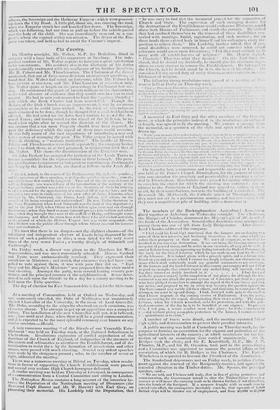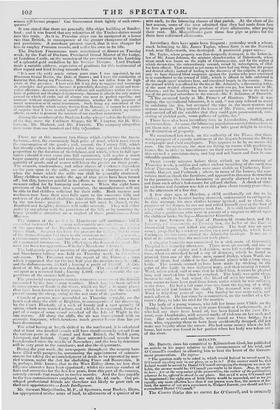The members of the Buckinghamshire Agriculturel Asseteeri , ne dined together at
Aylesbury on AVeduesday SCIIllight. '1 he Chine:en the AIttrquie of Chandos, announced his Alejesty's gift tit. it Nit) el the funds of the Association. Several other done titles were almounteel.
among them was WIC el' from Lady Bridgewater. :After dimete. Lord Chandos addressed the company.
" I feel (said his Lordship) convinced that the fimutuercu are awakening Itcavt
sense of their best interests, awl bestirring themselves hi the rtause whirl: - volves their prosperity or their ruin. We lung all cooperate, or we sit wr Ite iuvolved in one ettit.ir on destruction. If we earl Niue tie farming tittcre-t-i one point of general uni,m, and be active in our exertiene, all may yet be web. I cannot for bear from again expressing my feeling towards the I lightest Petsonag:t
the land, fiw the liberal donation which he has made to our fund we ene of the Lawmen It is indeed given with a princely spirit, and is a favour ferred on yon and on me which I cannot too Ileeply eqiniate, nor characteriart ra. terms which shall sufficiently mark my grateful sentiments to my
If the farmers and the landed interest in this county and country will not fraf!ctr so good ;itt example, they cannot expect any undertaking will succeed, witr,:irt I look forward
has their interest so (Imply involved in it with the greatest anxiety to the completion of our plans; for although Ow t.e- verlintertt may not attack the present system of Corn-laws, yet there is a parrv who have pledged tht runt:Ives to attempt the repeal of the Corn. laws ; and they are active, and prepared to try in every way to carry the question agaire,t res. The Government may tacitly aid their efforts, and therefore, to counteraca tfe.4-e attempts, we must be up and doing. I look forwatd with pain to the coeill,-1 that I know impends at the corning session of Parliament. I see the pttrty, who are s't iving for the repeal, disseminating their views widely. 'f 110 Old 111.!- Elyttiter, When his interest :s touched, seeks for protection, and with the poli- tical economists of the day Inc is to be benefited at our expense. To itre-tater. this, I tell you, a severe conflict must take place; Mr if the Corn-lao s he reiwaled without giving a complete protection to the farmer, I catmot ilf)V t a agriculturist is to exist."
A number of toasts were drunk, and the meeting separated fort et?, bigh spirit, and determination to protect their peculiar interests.
A public meeting was held at Canterbury on Thursday week, `O purpose of forming- art association for the support and protection 0, agricultural interests of the country; at which resolutions for tie minion of such an association were carried unanimously.
Bridges took the chair; and Sir E. Knatchbull, Mr. J. P. Plutntre, AI. P., and Sir II. Oxenden, took part in the prow:edit:see; and a Committee was appointed to manage the general affairs of tine association, of which Sir 13. Bridges is the Chairmam The Earl of AViticheisca is requested to become the President of the Association.
The Stmderland shipowners met on Friday week, to petition l'arlia, ment against the renewal of the Reciprocity-treaties, and against time it:tended alteration in the Timber-duties. Mr. Spence, the Niew/ speaker, said-
" We are told, and I believe told truly, that in lieu of giving protection area commiseration, the Govermuent intend to alter the Tiniber-duties in sad; c manner as will insure the carrying trade to be thrown further, if not altogether, into the hands of the foreigner. If a measure fraught with so much min be carried into effect, the consequence inevitably must be, that upwards of LOOM British ships will be thrown out of employment, and from tee),000 to -25,101)
*mown will become paupers! Can Government think lightly of such conse- quences?"
It was stated that there are generally fifty ships building at Sunder- land ; and it was feared that any relaxation of the Timber-duties would ruin this trade. As it is, Prussian bhips can be navigated at a lower rate than British, in consequence of the greater cheapness of timber and provisions. A merchant present stated, that it was cheaper for him to employ Prussian vessels, and suffer his own to he idle.
The Durham Freemasons were entertained at dinner on Tuesday week, by the Earl of Dui ham, Provincial Grand Master of the Lodge, • at Lambton Castle, on the occasion of the presentation to his Lordship of a splendid gold medallion by his brother Masons. Lord Durham trade a suitable address, expressive of gratitude for this testimonial of their regard and kind feeling towards him.
"It is now (he said) nearly sixteen years since I was appointed, by our Illustrious Grand Master, the Duke of Sussex ; and I have the satisfaction of knowing that, during my Presidency, Masonry has not !Wien from its high estate in this province. I have ever felt it may duty to support and encourage Its in inciples awl practice—because it powerfully develops all social and bene- volent affections—because it mitigates without and annihilates within the viru- lence of political and theological controversy—because it affords the only neutral ground on which all tanks and all classes can meet in perfect equality, and associate without degradation or mortification, whether for the purposes of moral instruction or of social intercourse. Such being my conviction of the inestimable benefits which society derives from Masonry, it cannot he a matter a surprise that I Live availed myself of the advantaq-cs which my station affords, in order to promote the interests of our excellent institution."
Among the members of the Durham Lodge who johmed in the festivities of the day, were Sir Cuthbert Sharpe, Sir W. Chaytor, Sir II. Wit- liam,ou, Mr. Harland, and Mr. Fawcett. The company altogether were more than one hundred and fifty inInumber.



















 Previous page
Previous page